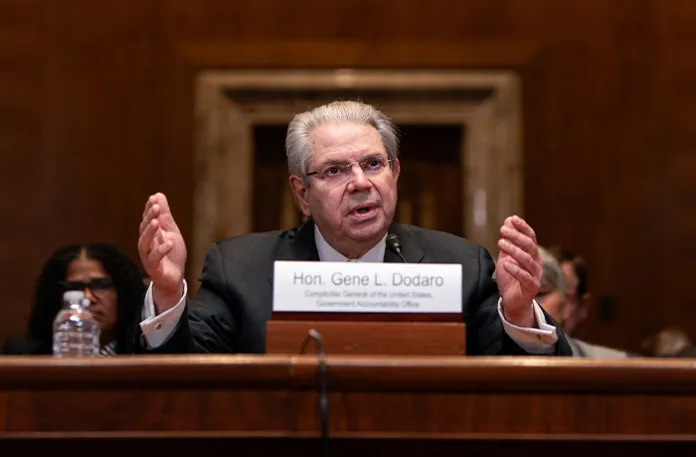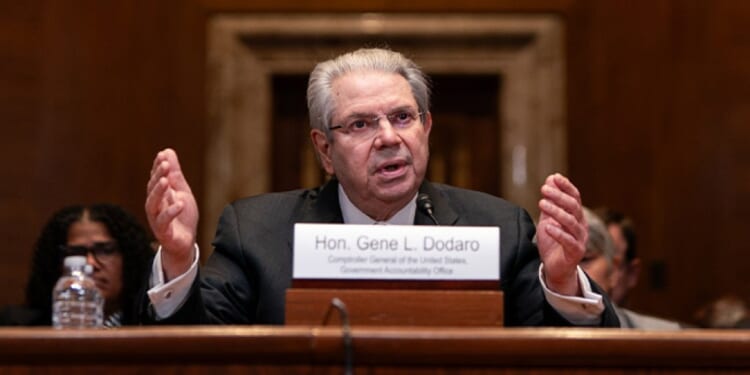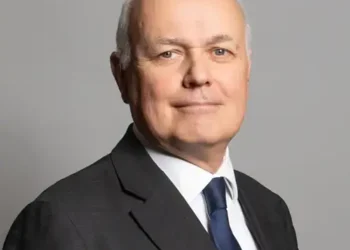Gene L. Dodaro is not a household name. He is a mild-mannered man who is rarely seen without a necktie and dark suit, and who speaks in a flat, matter-of-fact tone. He has worked for the federal government since 1973.
Yet, his retirement in December may well set off a separation-of-powers battle royale between President Donald Trump and Congress. Dodaro is the head of the Government Accountability Office, which has been a thorn in the president’s side during his second term.
And by law, Trump gets to nominate the next Comptroller General, as the GAO’s leader is termed.
Long before there was the Department of Government Efficiency, there was the GAO, which regularly publicly exposes governmental cost overruns and failed policies that squander taxpayer dollars. Congress established the nonpartisan agency in 1921 to audit agencies and help lawmakers root out fraud and rein in the federal deficit.

Today, GAO may be best known for its frequent reporting on “improper payments” flowing from executive agencies, which amounted to more than $160 billion last year. The agency’s deep-dive investigations of federal agency operations, such as the use of solitary confinement in federal prisons, often stoke congressional oversight.
Trump has made it a policy to bring to heel government watchdogs his administration views as needlessly interfering in matters best left to executive branch officials. Trump has fired or demoted at least 20 inspector generals, whose job it is to uncover illicit doings by executive branch agencies, since returning to office in January. The president also canned the heads of the Office of Government Ethics and the Office of Special Counsel, both of whom set policies aimed at curbing mischief by federal officials.
Earlier this year, the White House sought to embed a team of individuals from the DOGE in GAO. The agency rebuffed them and released a letter it sent to DOGE that declared, “GAO is a legislative branch agency that conducts work for Congress. As such, we are not subject to DOGE or Executive Orders.”
Repeatedly, the White House has clashed with GAO over its legal opinions faulting various executive agencies for failing to spend congressionally appropriated funds. Last month, for example, Dodaro’s team deemed illegal the Federal Emergency Management Agency’s “withholding, delaying, or effectively precluding the obligation or expenditure of budget authority” for a few disaster mitigation and relief programs. Subsequently, Russ Vought, the head of the president’s Office of Management and Budget, told executive agency heads that GAO’s reports and legal opinions should be considered “non-binding” on them.
In September, the clash flared up again. Vought criticized GAO, telling a conference of conservatives, “We are not big fans of GAO. They are a quasi-legislative independent entity … something that shouldn’t exist.”
Dodaro defended his agency in a statement to the media.
“Clearly, Russell Vought does not value transparency and accountability,” Dodaro said. “GAO’s mission is to support Congress in carrying out its constitutional responsibilities. During my tenure as Comptroller General alone, GAO’s work has saved taxpayers over $1.2 trillion and resulted in tens of thousands of improvements to how federal programs work.”
Dodaro’s 15-year term expires on Dec. 29, and Trump quite probably would prefer he be replaced with someone who would call off GAO’s oversight dogs.
At first blush, it might appear the president is likely to get his way. The GOP-controlled Senate has shown itself willing to vote for weak or ill-qualified nominees for high positions. Robert F. Kennedy, Jr., for example, was made the Secretary of the Department of Health and Human Services despite having little management experience and some crank ideas about health.
Yet, a closer look suggests the president may face an uphill battle in the Senate. Republican senators have been willing to deep-six Trump appointees, particularly to low-profile positions. Trump has withdrawn a record high of 48 nominations this year. In recent weeks, they have forced the withdrawal of nominees to the Bureau of Labor Statistics, the Export-Import Bank, and the Office of Special Counsel. They also appear to be rejecting Trump’s proposed ambassador to Kuwait.
Many, if not most, senators value GAO’s work. Unlike, say, communications from lobbyists, interest groups, and their political parties, GAO reports and opinions are factually-based. The agency does not get more money or rewards from helping a legislator understand why fraudsters can rip off the federal SNAP food program. GAO’s value would be greatly diminished if senators approved a new comptroller general who viewed himself as the president’s advocate and defender.
MIKIE SHERRILL WIN KICKS OFF PROCESS TO REPLACE HER IN HOUSE — HERE’S WHY IT COULD TAKE A WHILE
Nor does it appear likely that Trump could circumvent the Senate and install an acting head of GAO. The law empowers the GAO deputy director to take over the top position when Dodaro’s term ends, and it requires Congress to form a commission headed by the majority and minority leaders of both chambers to propose potential nominees for the president’s consideration.
And not to be forgotten is that Congress rebuffed Trump the last time he attempted this maneuver. This spring, his acting appointees were turned away from the Library of Congress and the Copyright Office, with the support of both Senate and House GOP leaders.
Kevin R. Kosar (@kevinrkosar) is a senior fellow at the American Enterprise Institute and edits UnderstandingCongress.org.
















